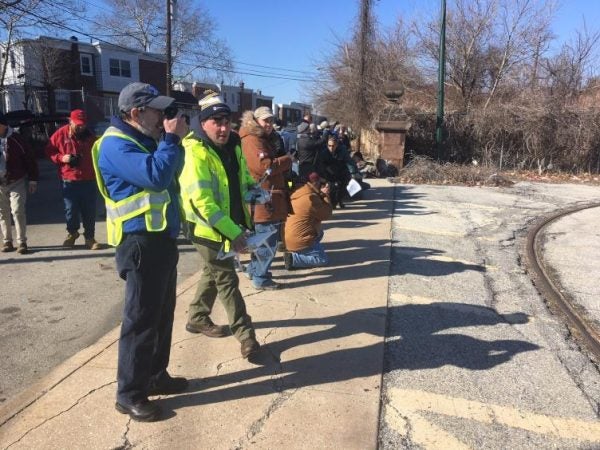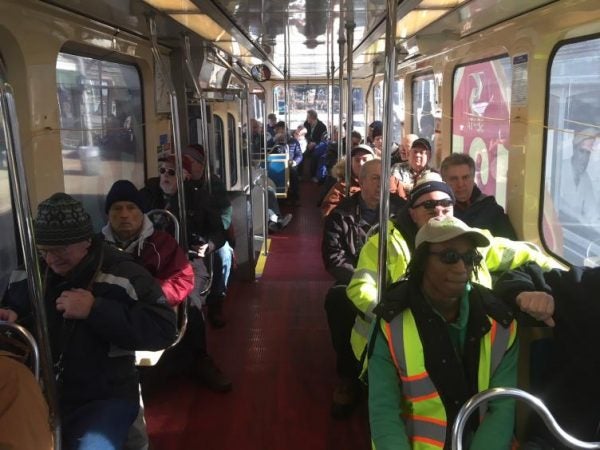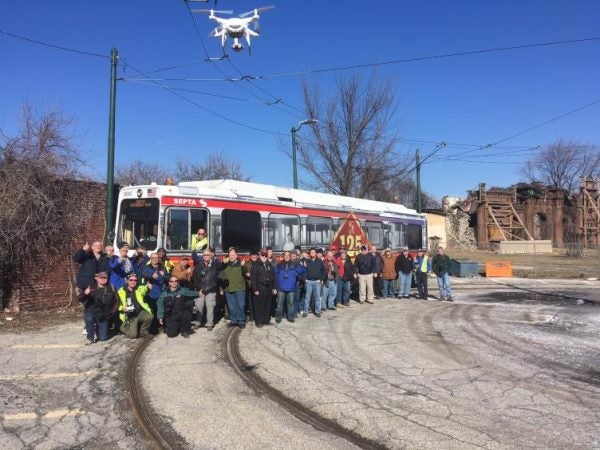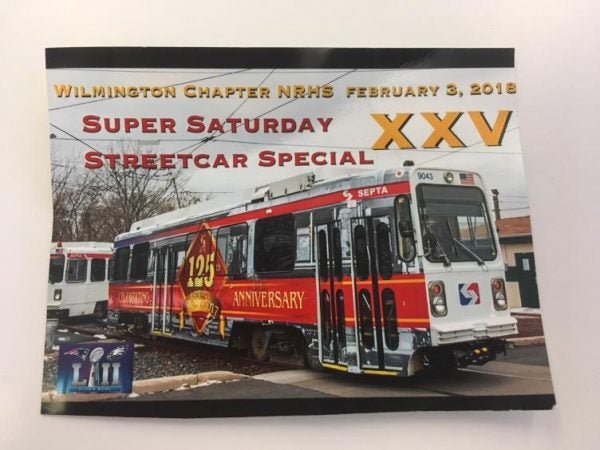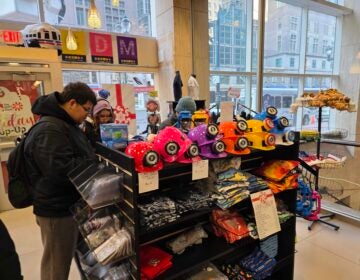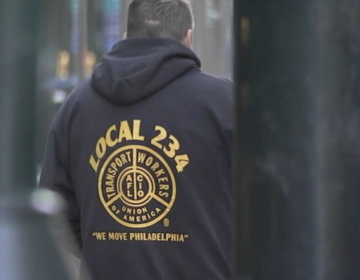Why 35 grown men traveled hundreds of miles to ride a SEPTA trolley
These railfans are not messing around.
Listen 4:32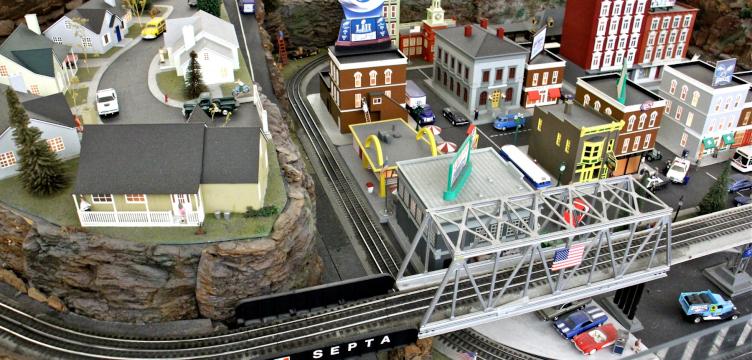
Model train displays on display at SEPTA's gift shop. (Emma Lee/WHYY)
Philadelphia has dozens of different government agencies. There’s the Police Department, Parks and Rec, Fire Department, Water Department, the School District and more.
But only one — SEPTA — has its own gift shop, located on the first floor of the transit agency’s headquarters at 1234 Market Street.
If you can slap a SEPTA logo on it, the shop probably sells it, said Peg Maguire, the store’s manager.
“Sweatshirts, tee shirts, hats, bags, magnets, keychains, earrings, jewelry, umbrellas, collectibles, buses, trains trolleys, train sets, train displays, books,” said Maguire. “Books are huge.”
There are also mugs, shot glasses, water bottles, puzzles, Thomas the Tank engine toys, and costume SEPTA safety helmets. But this year’s hottest item?
“Believe it not, this is our most popular one: the fanny pack,” said Maguire, pointing to a wall of bags and backpacks adorned with SEPTA’s stylized S symbol. “It’s come back; we refer to it as the ‘waist pack.’”
The shop, about the size of a Hallmark store or a small Wawa, was originally just an extension of SEPTA’s transit museum — the handful of model trains displays, bus memorabilia, and informative panels spread across the HQ lobby. But about nine years ago, Maguire convinced her bosses to rebrand, resulting in a nice bump in sales.
There are more than 500 items for sale, ranging in price from 50¢ SEPTA postcards to $519 model train sets.
Maguire says about half the customers are SEPTA employees: People who take pride in their job and want to show off where they work.
The other half?
Railfans. That’s the name train hobbyists have adopted to describe themselves.
“People get hooked, kind of like how people get into stamp collecting, coin collecting or model cars,” explained Maguire. “It’s the same kind of thing — they get into transportation.”
For area railfans, the SEPTA gift store offers seven different magazines about trains for sale — if you count Hot Spots, a spin-off of Trains Magazine, as a stand-alone publication, that is.
The store caters to the collector breed of railfan, the guy who builds model trains, decorates his home with the old R-designation train signs for sale, or slaps an “old railfans never die, they just lose track” bumper sticker on their car.
But you don’t need to be a collector to be a railfan. Lots of railfans are trainspotters. Like a noisier version of bird watching, the goal is to spy your quarry in its natural element. And if you can snap a photo of it, so much the better.
Every year, a group of railfans associated with the Wilmington chapter of the National Railway Historical Society (NRHS) and the Friends of Philadelphia Trolleys get together the Saturday before the Super Bowl to charter a SEPTA trolley for a day of photo shoots.
This year was the 25th Super Saturday Streetcar Special.
Bright and early in the morning, 35 railfans from all over the U.S. — one guy came from Ohio, and another from Montana — assembled at SEPTA’s Woodland Avenue depot in Southwest Philadelphia for a full day of streetcar riding and photographing.They boarded an actual SEPTA trolley, driven by an actual SEPTA employee, paid to take them wherever they want to go — at least, wherever there are working trolley tracks, of course. The cost: $840 for the first two hours, and $115 per half-hour after that.
The guys — it’s all guys, minus one very indulgent wife, and mostly over the age of 50 — don’t just want to ride the train: They want to document the experience. At designated stops along the route, they rush off the trolley, line up a few yards away, and then take photos of the trolley as it rolls slowly on by. Amazingly enough, local residents and drivers stuck in traffic behind the trolleys simply look on with bemused curiosity — there’s no honking or yelling.
Steve Barry, editor of Railfan and Railroad Magazine and president of the Wilmington NRHS, said that this was the 36th trolley charter trip he’s organized.
“Railfanning is a great hobby because it gets you outdoors, it gets you to see the country, you travel a lot,” said Barry during a stop at the Darby trolley loop. “You go to places you wouldn’t otherwise get to — I mean, why else would we be in Darby today, y’know?”
Railfans will travel the world in pursuit of their hobby.
“I’ve gotten to see a lot of things I wouldn’t have seen as just a tourist,” said Mike Burkhart.
When Burkhart goes on trips with his wife, there’s often one day where she goes to the beach, and he goes off on his own to photograph the locale’s trolleys and trains. Even though he’s gone on this very same Super Saturday Streetcar Special trip many times before, Burkhart said there’s always something different to draw him back.
“The thing with this hobby is that its never, its never complete,” said Burkhart. “There’s always something else to go do, always something new, always a new railroad, a new paint job, a new steam engine that comes on line that might not have been around for years.”
But if you ask Burkhart why he does it — why he’s so into trains — he’ll tell you he doesn’t really know.
“I get that all the time, and I don’t [know],” said Burkhart. “I think you’ll find if you talk to any of the guys on here, they’ll probably have the same answer: They’re not really sure, maybe it was something in childhood, maybe it was the mechanics of it or the bigness of it, or just the fascination.
“Everybody needs a hobby, right, and this is ours.”
Burkhart wasn’t exaggerating — everybody on the trolley said the same thing — they’re not really sure why they like trains, but they do. They just like trains, always have, ever since they were kids.
Railfans aren’t alone in not really understanding why they fan on rails. Psychologists are equally stumped — there hasn’t been much research on why people take up a hobby, let alone why they pick one over another, said Professor Paul Rosin of the University of Pennsylvania.
“It’s an area that desperately needs work,” said Rosin. “Psychologists don’t tend to study this kind of thing — they tend not to study things that people do.”
One book on the hobby, “The Railway Station: A Social History,” assigns Freudian motivations to the trainspotters’ predilection.
“The sexual connotation of trains is well known, particularly trains entering tunnels,” wrote authors Jeffrey Richards and John MacKenzie, professors at University of Lancaster. “Is this obsessive watching of trains sliding in and out of stations to be construed, in the child, as a substitute for sex and, in the adult, as a desire to prolong childhood definitely and avoid coming to terms with mature sexuality?”
Another possible motivation suggested by Richards and MacKenzie lay in an aspect of the hobby known as “copping,” the keeping of lists of trains seen. “Is this a desire to provide order and system in a disordered universe, to give life an encompassable finite purpose,” the authors asked.
In their final analysis, the two professors concluded that it may be best just to “simply describe trainspotting as one of those lovable British eccentricities, like garden gnomes, toy soldiers, strong tea, and talking about the weather.”
Outside the world of the British railroad scholarship, researchers have tried to understand why people join groups in general — and some of those findings resonate with the experiences of SEPTA’s fanboys.
One theory suggests that our self-esteem depends in large part on acceptance from others. And when someone shares the same obscure interest as you — maybe the one the other kids mocked you for — that can create a deep bond, not just with the person, but the hobby itself. It can become part of your social identity, a part of your self determination.
That’s what happened Dave Warner, who, back on the trolley, pointed to a friend of his a few seats away out his friend.
“Bob Bitzer, who is there in the red hat, we’ve known each other since 1970,” said Warner. “I was a teenager then. And here we are, I don’t even want to do the math… fifty years later.”
WHYY is your source for fact-based, in-depth journalism and information. As a nonprofit organization, we rely on financial support from readers like you. Please give today.



